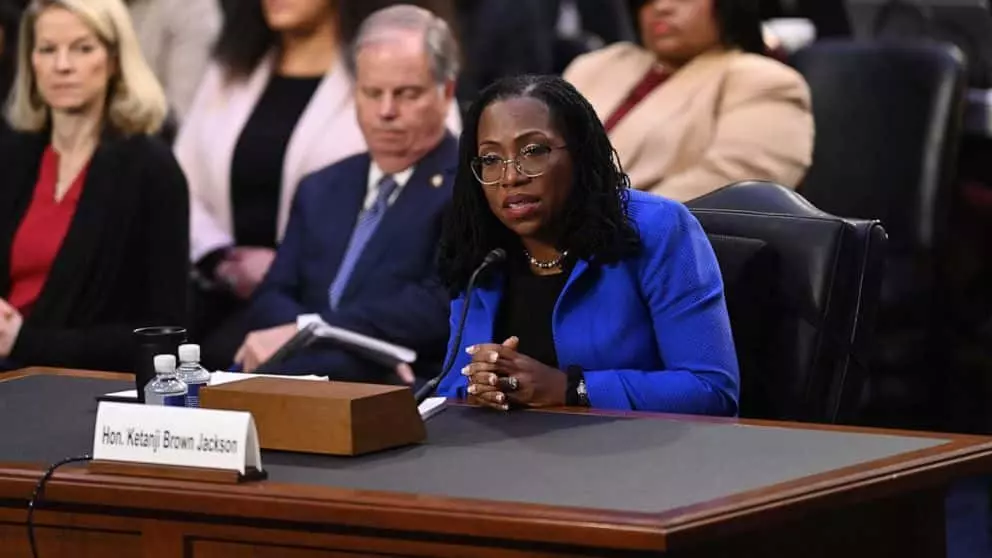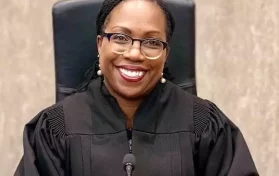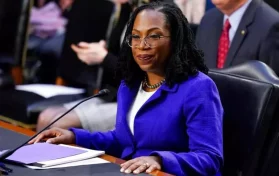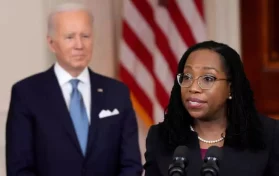
On Tuesday morning, Supreme Court Justice nominee arrived on Capitol Hill with her parents and husband in tow for a second day of confirmation hearings. Her confirmation hearings, which began on Monday, are historic in that she is the first African American female to be nominated to the position. She is only the third to be nominated to the nation’s highest court, behind Thurgood Marshall and Clarence Thomas.
Ketanji Brown-Jackson is no stranger to the process. She has been twice nominated to a federal court, and she’s been through a Senate confirmation for each of those appointments. She has been confirmed each time. Legal pundits believe that she will be confirmed as a Supreme Court justice as well.
Senator Dick Dubin (D-IL), the chairman of the committee, opened up with remarks before committee members were given an opportunity to pose questions to Brown-Jackson. Durbin noted, “Today is a proud day for America.” On Tuesday, Durbin opened the hearings with some questions of his own; some appeared to be “leading” questions that addressed Republican concerns. Durbin at length discussed a claim and several tweets made by Missouri Senator Josh Hawley, a Republican. Hawley brought into question several of Brown-Jackson’s rulings regarding non-production child pornography, with the implication that the judge is to be considered “soft on crime.”
During her response to the question, Brown-Jackson appeared shaken. She looked in Hawley’s direction multiple times as she spoke, where she inferred that she was only using Congressional guidelines in sentences.
Durbin also broached the subject of Brown-Jackson’s judicial philosophy, and then he posed a comment and question about the idea of court-packing.
Durbin even shared 2020 Supreme Court nominee Amy Coney Barrett’s comment regarding one political party’s propensity to pack the Supreme Court: She said, I quote, ‘could not opine on it.’ And on many other policy issues, then-Judge Barrett said repeatedly she could not share her views, stating, and I quote, ‘I will not express a view on a matter of public policy, especially one that is politically controversial, because that is inconsistent with the judicial role.'”
Brown-Jackson’s answer to the question seemed to echo Durbin’s comment: “Judges should not be speaking in to political issues and certainly not a nominee for a position on the Supreme Court.”
Republican fact-checkers were quick, however, to share that Coney-Barrett’s quote was taken out of context.
Republicans have also had questions about Brown-Jackson’s defense of international detainees at Guantanamo Bay. She infamously defended one suspected terrorist, and, when questioned about her defense of the individual on Tuesday, Brown-Jackson replied that what she had done was in service to her country, much the way her brother served in the armed forces.
Brown-Jackson has said in interviews and during the initial day of confirmation hearings that she intends to be “independent” and that she views her responsibility on the bench “very seriously.”
Brown-Jackson told the Senate committee on Monday: “I decide cases from a neutral posture. I evaluate the facts, and I interpret and apply the law to the facts of the case before me, without fear or favor, consistent with my judicial oath.”
Brown-Jackson was questioned by Senator Chuck Grassley (R-IA) on Tuesday morning, who, in his typical point-blank fashion, outright asked the nominee how she felt about freedom of speech and the “fundamental right” of gun ownership. Grassley pressed Brown-Jackson on her opinion as to freedom of speech for liberal versus conservative views, and the nominee affirmed that she believed in freedom of speech no matter what side of the aisle one was on. However, she could not give a definitive answer regarding gun ownership as a fundamental right under the Constitution.
Brown-Jackson also appeared to skirt a question regarding whether the Constitution is a “living document.”
However, Brown-Jackson has a great deal of backing from both sides of the aisle. A Republican who served on the US Court of Appeals of the DC District said of the nominee: “Judge Jackson is an independent jurist who adjudicates based on the facts and the law and not a partisan.”




